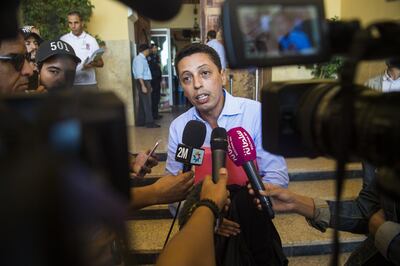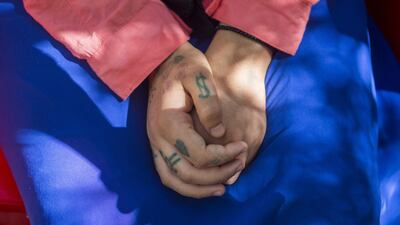On Wednesday, Morocco marked the annual National Women’s Day, founded a decade ago to promote gender parity in the North African kingdom.
But this year, attentions were drawn away from the token commemoration towards a new and ambitious movement known as #Masaktash, and which translates as ‘I won’t be silent’.
#Masaktash began as a Twitter hashtag three weeks ago and it trended on its first day. Using this phrase, supporters highlighted the cultural tolerance of gender-based violence by condemning prominent cases of rape, murder and assault. Followers also shared their own experiences of harassment and assault. The campaign has already been compared to the #MeToo movement.
The campaign was established after the prominence of the case of Khadija – a 17-year-old who accuses 12 men of her kidnap and gang-rape in August near the town of Beni-Mellal in southern Morocco. The men were arrested and the one underage suspect – also 17 years old – appeared in court this week facing an array of charges including rape, torture, kidnapping, making death threats and forming a gang.
"I call on all girls to be brave. We girls are strong and we must stay strong," she told the press after attending the hearing in the central city of Beni Mellal.
"I'm still traumatised. What happened to me is not easy to bear," she said, nervously attempting to cover up rudimentary tattoos on her hands allegedly carved by her abductors.

On September 12, a new law came into force in Morocco that criminalised abuse against women, domestic violence, and sexual harassment, amid widespread criticism that the bill’s legal grounding fell drastically short and that it would ultimately have no effect on Moroccan society.
In 2009, a Moroccan governmental survey found that 62.8 per cent of women had experienced physical, psychological, sexual or economic violence in the country.
Zineb Belmkaddem, one of the organisers behind #Masaktash, said it was started to show solidarity with other Moroccan women who were subject to male sexual violence. “We began the campaign to raise the voices of women and point to how they had been either ignored or silenced and even attacked,” she explained.
“The group is comprised of members with rich and eclectic professional backgrounds,” she said. “First and foremost, we hope to raise the voices of women as equals and of women survivors so they, too, can be heard.”
Through the hashtag, scores of women have recounted being groped, harassed and stalked, often as children or young teenagers.
Many tell of verbal and physical harassment on public transport or in the street, as well as cases of indecent exposure, assault, and mugging, frequently met with indifference from passers-by or even local police.
Translation: "I have dozens and dozens of stories. The harassment began when I was 11 or 12 years old. I couldn't leave home without receiving comments about my body, touches, etc," one user wrote.
Translation: "My last experience was two months ago in Tangier. I was harassed by 4 teens and the person who reacted, supposedly to save me, then asked me for my phone number," said another.
Translation: "My [case] was not with a person begging, but with a parking attendant, [when I was] 12/13 years old. He carried me down the stairs since the elevator was broken, keeping his hand on my breast for five floors. At one point I tried to remove it, and he immediately put it back," another Moroccan woman revealed.
Translation: "I was 11 years old, I was going shopping, a man in his early twenties stopped me in the street and kissed me in the corner of my lips. I was paralysed. I asked him if I knew him and he said, "No, I just wanted to kiss you." I ran away.," one more victim recounted.
Comparisons between #Masaktach and #MeToo were quick to come in, but Ms Belmkaddem sees the significance of the campaign in Morocco as far broader.
“There’s an intersection between #Masaktach and #MeToo regarding speaking up publicly and raising the voices of survivors of sexual assault and rape,” she explained.
“But #Masaktach has a scope that is wider and aims at raising the voices of Moroccan women be [they] survivors or women speaking up against other forms of inequality.”
She points to the struggle for equal land rights for women in Morocco as proof of the nation’s need for, and ability to tackle, gender parity.
In July, after a decade of advocacy, ethnic Sulaliyyate women in Morocco succeeded in achieving equal land rights to their male compatriots. The movement, with the support of the Democratic Association for Moroccan Women (ADFM) succeeded in ensuring that land distributed in a state-run lottery be divided equally among men and women.
#Masaktach is similar in its ambition, calling for Moroccan radio stations to boycott the music of superstar Saad Lamjarred, who has is facing three separate charges of rape in France. After initially being released under supervision pending further investigation, an appeal in French courts ordered Mr Lamjarred be returned to jail on September 18.
“His songs were still broadcasting on various radios at the time. The movement aimed at broadcasting the women’s voices instead,” Ms Belmkaddem explained.
_________
Read more:
Support for Moroccan teen intensifies as alleged captors deny wrongdoing
Moroccan star Saad Lamjarred arrested in France over alleged rape
After a third rape charge, have Lamjarred’s fans finally woken up to a darker truth?
_________
The campaign has had some success. Two Moroccan stations, Radio 2M and HitRadio, announced that they would no longer air the singer’s music.
But Mr Lamjarred’s popularity persists, with legions of fans denying the accusations and a number of radio stations refusing to pull his tracks off the airwaves. Radio Chada FM said it would not take the singer off the air until he had been tried, under the presumption of innocence.
Since #Masaktach, a second hashtag, #mashi_b_sif – meaning not by force – has taken off, in response to the murder on September 29 of 20-year-old Oumaima who was stabbed 20 times after repeatedly rejecting her killer's proposals in Meknes, northern Morocco.
The movement’s founders have since formed Twitter and Facebook accounts and, today, #Masaktach describes itself as a collective of men and women who condemn gender-based violence and the legitimisation of rape culture in Morocco. It calls for protection, consideration, and respect of Moroccan women’s integrity and dignity.
As the debate continues, Moroccans have taken to social media to call for social reforms and more rigorous legal protection for women in the kingdom. It has also opened up the discussion to wider discussions of gender dynamics, including the intersection of classism and sexism.
Some supporters have even pointed to the recent killing by the Moroccan navy of a young female attempting to cross to Spain as an example of social normalisation of violence against working-class women. Morocco has become a key route for migrants trying to enter Europe with nearly 39,000 people crossing into Spain by mid-September.
Ms Belmkaddem acknowledges Moroccan women’s “history of struggle for equality,” but she remains confident in the strides that women have already achieved, and in the role that #Masaktach will play in the future of gender parity in Morocco.
“We absolutely believe having #Masaktach as an online and social presence helps, it’s a much needed megaphone of sorts for women’s voices,” she said.

